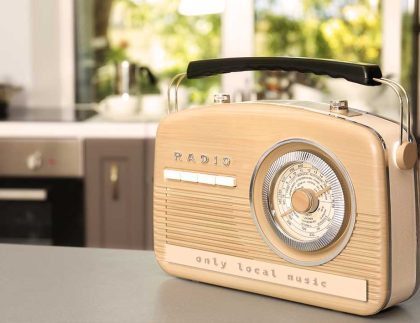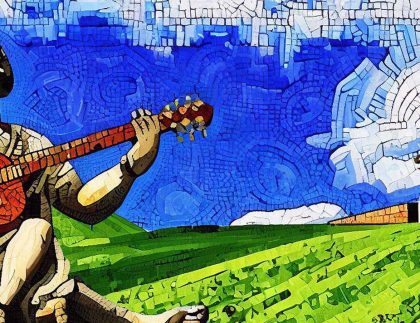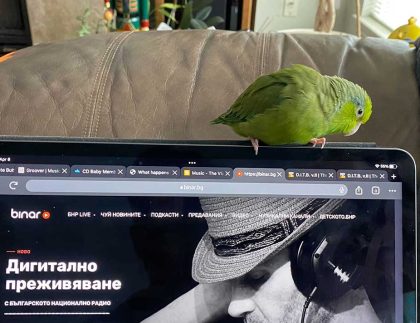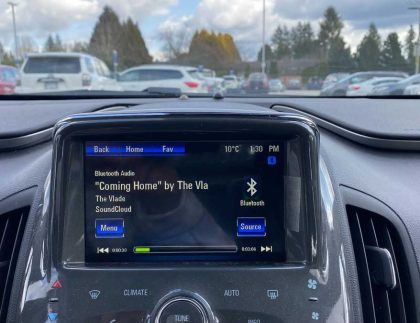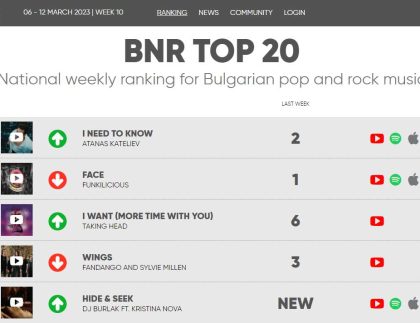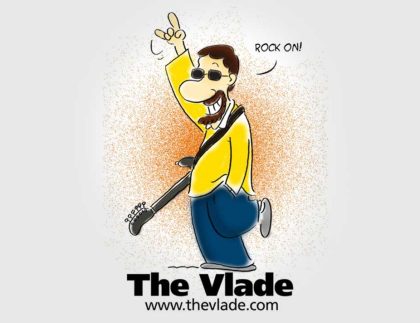
My song "Coming Home" was included in the Bulgarian Top 20 music chart, and has made some waves. I got an interview in my hometown newspaper, and now one of the largest national daily newspapers published an article about my life story: from the point when Валентин Костов first published a cartoon I made, to Ивайло Нинов who introduced me to the folks in 168 Hours. From “Reporter 7” to “Reader’s Digest” and from Bulgaria to Canada. From Theodore Ushev to Ilko Birov who inspired me to master the courage and submit my song to БНР ТОП 20.
by Maya Georgieva for Faktor.bg
The song "Coming Home" has broken into the Bulgarian National Radio "Top 20" chart and is already in the 15th position. Its author is Vlad Kolarov, who has lived and worked in Vancouver for almost 25 years, but Bulgaria continues to be close to his heart.
"I never thought that something written 'in the basement', completely spontaneous, would find its place on the radio music chart... To be honest, I fell off my chair when I heard the news. I had almost stopped making music after my brother left us six years ago... It wasn't until a year ago, after my work computer blew up and I had to rebuild it (with all its music programs) that I got back into it. Then, thanks to Theo Ushev (an amazing animator, artist, and director), I heard a wonderful song by Ilko Birov (Mrs. James), and that's where the idea came to me - why don't I offer something to BNR," Vlad tells Faktor.bg.
"I'm still not very happy with the song’s sound. It is no coincidence that usually many people are involved in the making of songs (sound engineers, producers, arrangers...). But for me, it's fun and a way to learn something new. And harass the family by waking them early in the morning to the sound of a tortured croaking deaf singer. By the way, when I said "singer", this song is not sung by me. I experimented with a guest singer to see if it would increase the quality of this fictional band 'The Vlade,'" explains the "Coming Home" writer.
Vlad Kolarov has a
dynamic and interesting life story - his hobbies and professional pursuits intersect
over the years dynamically, but the creative urge and the fate of an artist do not leave him.
Today, Vlad perceives himself as a dinosaur because he was born in the Danube capital of Ruse in the sixties of the last century. He perceives life as a strange series of coincidences: "It is only when you have walked it that you can look back and see your tracks - a little confused, often meandering, sometimes close to the edge of the abyss, but which led to where you are now."
The family chronicle is extremely curious, and Vlad admits that he inherited something important from each of his relatives.
"My mother, the poet Anita Kolarova, and my father Grigor Kolarov were teachers of Bulgarian language and literature. To them, I owe my love for literature and books, which, especially in the first part of my life, I devoured in large quantities. My grandmother, Anka Popova, was an artistic person. Her great love was the movies, that's why the house where I was born was close to the old "Tsanko Tserkovski" theatre. But painting was her real passion. As a self-taught artist, my grandmother held several exhibitions in Rousse and always encouraged my inclination to "doodling." My grandfather, Dimitar Popov, was a lawyer, and I owe my decision to study law at Sofia University to him. To my brother Julian Kolarov, who was six years older than me, I owe my love for music, as well as my decision to enter the English High School like him, where I met not only very good friends but also my wife, Dessi. He is also partly to blame for the decision to move to Canada, as he was the first to go to Vancouver. Unfortunately, exactly six years ago, he left us after an uneven battle with cancer..."
Drawing was Vlad's childhood passion, and his love for cartoons began at an early age.
"I still remember lying on my stomach in my parents' bedroom, studying the last page of Parallels magazine, which printed cartoons from all over the world. At school, I had the most fun watching my classmates die of laughter at some of my doodles. Caricatures became a way of communication for me, without even imagining that one day I would be able to make a living from it.
"A vivid childhood memory is when I once passed by the window of a studio in Rousse and saw an artist who was painting in a frenzy. When I saw the same drawing on the pages of the Dunavska Pravda newspaper the next day, a light went on in my head: this is how these cartoons appear...", Vlad recalls.
However, his professional encounter with cartoons
was a completely random turn of fate. As a student in Sofia, his attic neighbor turned out to be Valentin Kostov - at that time a journalism student. It was he who saw Vlad's first cartoons and printed one of them in the newspaper where he was interning. The first publication gave Vlad the confidence to go to the Sofia editorial offices and show his drawings.

"After November 10, '89, there was a chance for me to find my way. New publications were emerging, and new names were in demand. My cartoons began to be regularly printed, from "Reporter 7" to "Starshel". It was through "Starshel" that I met the great artist Ivaylo Ninov, who then introduced me to the editorial office of "168 Chasa". They were starting the first afternoon daily newspaper in Vrabets and had an idea for a comic. This was perhaps the first comic strip to appear in Bulgaria, called "The Sparrow", which we drew together with Iliyan Chavrakov. Unfortunately, "The Sparrow" only lasted for one year and flew into nothingness..." Vlad recalls.
One of Vlad's signature stories as a cartoonist is the story of how
the comic strip "Phil the Cat" came to be.
"Because we had a small and crazy kitten in the attic (in a moment of inspiration caused by midnight study sessions on Renaissance English literature, my wife had named him "Philaster"), I offered Vlado Raichev (deputy editor-in-chief of "24 Chasa") a new comic strip: "Phil the cat". I believe it was 1992, and the prime minister was Philip Dimitrov. The comic was taken as a nod to the government, and unfortunately, as an apolitical individual, I had a completely different vision of the direction the comic should take. The last thing I wanted was for it to become political," admits the creator.
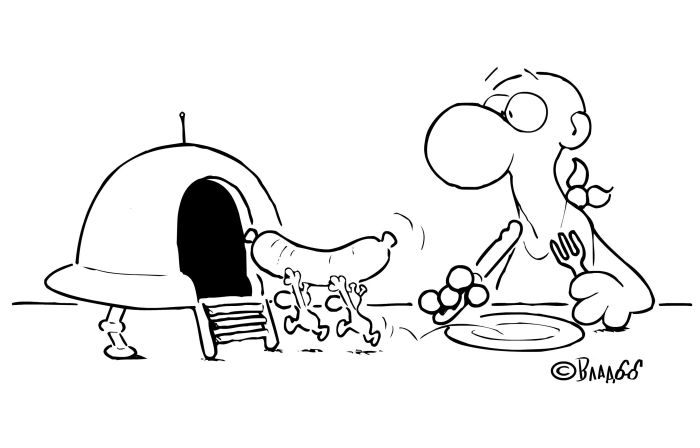
One of Vlad's first cartoons
After the conclusion of the "Phil the Cat" story, he was given the opportunity not only to work for "Newspaper for Women" but also to try out another idea - "self-syndication". He created weekly packages of cartoon drawings and games, such as "Jumbler" - a game where you have to guess the text of a cartoon from jumbled letters, and offered them to regional publications throughout Bulgaria. He began to publish abroad, which focused interest on the young author and his work overseas. This is how he came to be included as an honorary non-member in the NCS (National Cartoon Society in the USA) Album (1996).
"In 1996, the year crept up on us. For those who don't remember, these were terribly difficult times with hyperinflation, crime, and confusion. For me, my wife, and our three-year-old daughter, these years were decisive for the next step in our lives.
One night, an attempted break-in at our rented apartment was the final straw. Without seeing a future with security for our daughter, we made the difficult decision to look for a life outside our homeland. That's why we applied for emigration to Canada - a process that took two years."
Anyone who hasn't started from scratch (and sometimes maybe even below scratch) doesn't know what it's like to be an immigrant. Leaving behind parents, relatives, and friends is one of the hardest decisions a person can make. Fortunately, we were able to be reunited with my brother and his family, which was extremely important to us.
In the fall of 1998, I started working as a night shift printer in a Canadian factory. During the day, I worked on developing my first websites and searching for clients. After about nine months, I mustered up the courage to leave the factory and devote myself entirely to developing my own small business. I built a fairly popular e-card site while collaborating with a large company in New York. Yahoo approached me to help them make a similar card section on their portal. Publications in numerous magazines followed, including Reader's Digest, the best-selling magazine in the US with a circulation of millions.
My wife and I founded the company "Cardsup Greetings", which became a small boutique design studio.
Of course not
it's all honey and butter
The several major financial turmoils in America have affected millions of people around the world as well as us. Losing customers creates uncertainty. We had to sell the web hosting business (part of our company's activity), and then an opportunity arose for me to join PressReader, a newspaper and magazine platform (kind of like Netflix for print publications)," the Bulgarian presents his emigrant odyssey.
The author of "Coming Home" is not at all indifferent to the topic of Bulgarian societies abroad. According to him, they are a kind of mirror of Bulgaria.
"Little glasses where our souls are viewed. There are all kinds of people, all kinds of destinies. Some manage to get back on their feet, establish homes and careers, while others return, realizing that life is hard no matter where you are. Some return only to become disillusioned with the confused everyday life in their homeland and go abroad again - fate," Vlad believes.
Regardless of the twists and turns, music remains a constant presence in his life. For him, it is a kind of therapy that helps him both in difficult times and good days. He doesn't know if it's a gift or some form of insanity, but music plays constantly in his head. And sometimes he has to take it outside.
"Of course, this is a peculiar process with its own characteristics. Creating a song, from a musical idea to finished product, is part art, part science, and part craft. Since I don't consider myself an exceptional singer, let alone a musician, for me, this is primarily a hobby, but also an opportunity to learn something new," says Vlad as he reminisces about his years at the English High School in Ruse. They were known as the "musical class" - they only sang. They even created a small group similar to the "Singing Stars," which later was reborn into the "Kukeri" group.
Now, Vlad has made a small studio in the basement of his Canadian home, where he records his ideas. Then comes the hard part - making them sound good. He admits that he's still not quite up to it. But the whole process of mixing and tuning is a whole other world, where music is a kind of language that speaks to another magical language.
For the future of "Coming Home," Vlad does not have high expectations for a good ranking, but he is excited by the opinion of the audience, who hardly guess what an interesting person is behind the piece. He also never imagined that although virtually,
he would return with "I'm Coming" to the Bulgarian stage as a songwriter,
but believes that his brother and mother will hear this composition in the afterlife.

